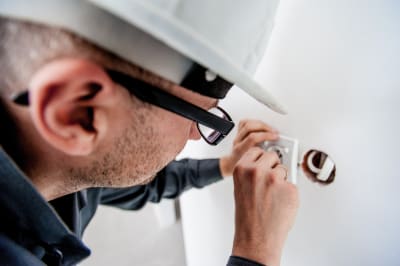Electricians in Hawaii oversee electrical projects in several environments (residential and commercial) and on various scales, from minor repairs and maintenance to major upgrades and installations. To become a successful electrician in the state, candidates must receive robust training from an approved institution.
Of course, residents enjoy a great deal of flexibility in their particular learning arrangement. Some may choose, for instance, to commit fully to real-world training, while some may prefer to get started in the classroom.
Below, we explore the basic requirements, educational options, certification possibilities, licensure considerations, and some specific, high-quality training programs for aspiring electricians in Hawaii.
How to Become an Electrician in Hawaii
The following is an overview of how to become an electrician in Hawaii.
Step 1: Starting the Process
To receive admission into an electrician program in Hawaii, candidates must be at least 18 years old and have a high school diploma or GED equivalent. Other requirements to consider at the beginning of the process include being in solid physical condition, preparing for oral interviews, and brushing up on mathematics/algebra skills.
Step 2: Training Requirements
Electricians in Hawaii are expected to receive classroom and hands-on training to start their careers.
Classroom Training
Classroom training programs are synonymous with academic programs. These kinds of programs are offered by community colleges and trade schools, which typically focus on helping students understand the fundamental principles of the job.
Of course, some programs offer laboratory and even hands-on training opportunities. In an upcoming section, we explore a few top options to consider.
Hands-On Training
Hands-on training is needed to ensure aspiring electricians understand the job’s demands in an actual work environment. This kind of training arrangement is popular through apprenticeship organizations. Hawaii boasts several electrician apprenticeship programs, including those overseen by JATCs and a union apprenticeship program courtesy of the Hawaii Electricians Training Fund.
Step 3: Employment & Contracting
After completing the steps above and obtaining a license, aspiring electricians in Hawaii may secure employment. They may also become contractors and start their own companies.
We explore the steps required to do so below.
Explore trades with similar paths:
Licensure & Certification Requirements
Electricians in Hawaii are expected to acquire a license from the Hawaii Board of Electricians and Plumbers before they start their careers. The board is a division of the state’s Department of Commerce and Consumer Affairs, Professional and Vocational Licensing Division.
To be licensed, individuals must complete an apprenticeship or a technical college program. They may then fill out an application for the journey worker license or the journey worker specialty license. After receiving their licenses, candidates must maintain them by attending continuing education classes and renewing them every three years.
Journey worker electricians in the state may become supervising electricians after gaining four years of experience on the job. Supervising electricians may go on to become independent Electrical Contractors by registering with their Hawaii Contractors License Board.
Top Electrician Schools in Hawaii
The state of Hawaii has the following top-class training programs for aspiring electricians.
Honolulu Community College
Honolulu, HI Campus Only
Honolulu Community College has a wonderful electrical installation and maintenance technology program for aspiring electricians in the state.
Tuition
$131 - $345 per CreditContact
(808) 845-9228
koidej@hawaii.edu
Kauai Community College
Lihue, HI Campus + Online
Kauai Community College offers aspiring electricians in the state a 15-credit certificate of competence program and a 47-credit certificate of achievement program.
Tuition
$131 - $357 per CreditContact
(808) 245-8225
arkauai@hawaii.edu
Leeward Community College
Pearl City, HI Campus + Online
Lastly, aspiring electricians in Honolulu can also consider Leeward Community College and its array of electrical technology programs.
Tuition
$131 - $345 per CreditContact
(808) 455-0011
wlabby@hawaii.edu
Explore electrician schools in Hawaii by city:
Salary & Career Outlook
In Hawaii, the average annual salary of an electrician is around $79,257. This number was obtained from a survey of electricians in the state and is, incidentally, very well in line with the annual average figures for other states.
For those still finding their way in the profession, it is possible to earn below this figure. Their numbers usually hover around $51,426, which is good enough for the bottom 10%. The highest-paid in the top 10% tend to earn an average salary of $122,149 at the end of the year.
Among the factors that may influence these figures are location, experience, specialty, and employer.
Aiea is the highest-paying location for electricians in Hawaii, with an average annual salary of $110,466. Kailua-Kona, with an average annual salary of $101,302, and Hilo, with an average annual salary of $89,558, are among the highest destinations.





